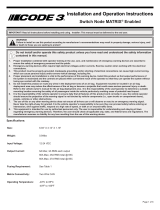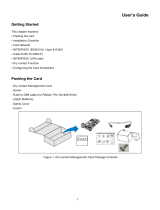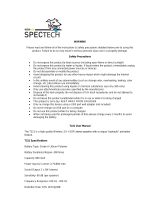Page is loading ...

Handbook
HA029931
November 2012 (Issue 2)
T225X
T225X ELIN/ALIN
Bridge Unit

© 2012
All rights are strictly reserved. No part of this document may be reproduced, modified, or transmitted in any
form by any means, nor may it be stored in a retrieval system other than for the purpose to act as an aid in
operating the equipment to which the document relates, without prior written permission of the
manufacturer.
The manufacturer pursues a policy of continuous development and product improvement. The
specifications in this document may therefore be changed without notice. The information in this document
is given in good faith, but is intended for guidance only. The manufacturer will not accept responsibility for
any losses arising from errors in this document.


Intentionally left blank

T225X HANDBOOK
HA029931 Contents
Issue 2 Nov 12 Page Contents - i
CHAPTER 1 INTRODUCTION ..................................................................................... 1-1
1.1 MANUAL CONTENTS ........................................................................................................................1-1
1.2 OTHER INFORMATION SOURCES ..................................................................................................1-1
1.3 THE T225X INSTRUMENT ................................................................................................................1-2
1.3.1 Typical applications ........................................................................................................1-2
1.3.2 Features .............................................................................................................................1-3
CHAPTER 2 INSTALLATION ....................................................................................... 2-1
2.1 SAFETY AND ELECTRO-MAGNETIC COMPATIBILITY (EMC) INFORMATION .....................2-1
2.1.1 Installation requirements for EMC .............................................................................2-1
2.1.2 Installation safety requirements .................................................................................2-2
2.1.3 Keeping the product safe .............................................................................................2-2
2.2 UNPACKING ........................................................................................................................................2-3
2.2.1 Handling precautions .....................................................................................................2-3
2.3 MECHANICAL LAYOUT .....................................................................................................................2-4
2.3.1 Layout drawings ..............................................................................................................2-4
2.3.2 Mount a Unit ....................................................................................................................2-4
2.4 CONNECTIONS AND WIRING .........................................................................................................2-5
2.4.1 Communications .............................................................................................................2-6
2.5 POWER SUPPLY CONNECTION ......................................................................................................2-8
2.6 RELAY CONNECTIONS ......................................................................................................................2-8
2.7 NODE SETUP .......................................................................................................................................2-9
2.7.1 Setting the IP Address ...................................................................................................2-9
2.7.2 LIN Node Numbering ..................................................................................................2-11
CHAPTER 3 USER INTERFACE ................................................................................... 3-1
3.1 STATUS LEDS ......................................................................................................................................3-1
CHAPTER 4 CONFIGURATION ................................................................................... 4-1
4.1 TOOLS: THE CONFIGURATION TOOL ..........................................................................................4-1
4.2 TERMINAL CONFIGURATOR ...........................................................................................................4-2
4.2.1 Running The Configurator ............................................................................................4-2
4.3 ADVANCED CONFIGURATION .......................................................................................................4-4
4.3.1 Cold Start Parameter File .............................................................................................4-4
4.3.2 Event Log File ...................................................................................................................4-5
Contents

T225X HANDBOOK
Contents HA029931
Page Contents - ii Issue 2 Nov 12
APPENDIX A SPECIFICATIONS .................................................................................... A-1
A.1 INSTALLATION CATEGORY AND POLLUTION DEGREE ...........................................................A-1
A.1.1 Installation category II ...................................................................................................A-1
A.1.2 Pollution degree 2 ..........................................................................................................A-1
A.2 SPECIFICATION ..................................................................................................................................A-2
A.2.1 General specification .....................................................................................................A-2
A.2.2 Hardware specification .................................................................................................A-3
A.2.3 Software specification ...................................................................................................A-3
APPENDIX B TERMINAL CONFIGURATOR ................................................................... B-1
B.1 THE CONFIGURATOR .......................................................................................................................B-1
B.1.1 Configurable items ......................................................................................................... B-1
B.2 RUNNING THE CONFIGURATOR ...................................................................................................B-2
B.2.1 Main menu access .......................................................................................................... B-2
B.2.1 The Main menu ............................................................................................................... B-3
B.2.2 Quitting the Terminal Configurator ..........................................................................B-3
B.3 DATABASE CONFIGURATION ........................................................................................................B-4
B.3.1 INSPECT command ........................................................................................................ B-4
B.3.2 UTILITIES command ....................................................................................................... B-4
B.3.3 ALARMS command ........................................................................................................ B-7
Index .......................................................................................................................Index-I

T225X HANDBOOK
HA029931 Chapter 1
Issue 2 Nov 12 Page 1 - 1
CHAPTER 1 INTRODUCTION
The T225X is an ELIN/ALIN Bridge Unit. It provides ELIN/ALIN connectivity, and requires initial setup, but
thereafter provides transparent LIN communications between nodes on both LIN communications protocols.
1.1 MANUAL CONTENTS
This manual is divided into the following chapters:
Chapter 1. Introduction
Chapter 2. Installation
Chapter 3. User Interface (explaining the LEDs and switches)
Chapter 4. Configuration (basic overview of using the Terminal Configurator to modify the communications
protocols on site, usually to match changes in the plant being controlled and additional features
concerning advanced features, i.e. Cold Start Parameters and Event Log).
Appendix A. Technical Specification (Hardware and software unit details.)
Appendix B. Terminal Configurator (overview of the instructions for connecting and using the Terminal
Configurator)
1.2 OTHER INFORMATION SOURCES
For details of Local Instrument Network (LIN) based Function Blocks, their parameters and input/output connections
refer to the LIN Blocks Reference Manual (Part no. HA 082 375 U003) which explains how control strategy function
blocks are selected and interconnected etc.
Note This unit should not require any form of configuration.
The creation, monitoring and On-line Reconfiguration of LIN Databases and LIN Sequential Function Charts (SFCs)
is described in the LINtools Help (Part no. RM 263 001 U055). The ELIN User Guide (Part no. HA 082 429) gives
full details of installation, and how to configure an ELIN network, including setting the IP address using the
instruments internal configurator.
Note If you do not possess any documents stated in this document please contact your distributor.

T225X HANDBOOK
Chapter 1 HA029931
Page 1 - 2 Issue 2 Nov 12
1.3 THE T225X INSTRUMENT
The T225X comprises a single unit used to connect ELIN and ALIN networks.
1.3.1 Typical applications
The instrument is designed to exchange LIN communication messages between nodes on an ELIN (Ethernet) and an
ALIN (Arcnet) network.
Figure 1-1: T225X ELIN/ALIN Bridge Unit

T225X HANDBOOK
HA029931 Chapter 1
Issue 2 Nov 12 Page 1 - 3
1.3.2 Features
The main features of this instrument are as follows:
LIN
The Local Instrument Network (LIN) is a collection of LIN instruments, and LIN communications, etc. that together
form the control system.
LIN COMMUNICATION
The Local Instrument Network (LIN) communications is a proprietry communications system used to connect each
LIN instrument in the network.
ELIN COMMUNICATION
ELIN communication is the LIN communications system transported via Ethernet. It allows peer-to-peer
communications between nodes on an ELIN and an ALIN logical network, see section 2.4.
ALIN COMMUNICATION
ALIN communication is the LIN communications system transported between Arcnet cards in the instrument. It
allows peer-to-peer communications between nodes on an ELIN and an ALIN logical networks, see section 2.4.
REDUNDANT INSTRUMENT
The instrument can be wired for redundant or non-redundant operation, see section 2.4.
HEALTH MONITORING
Automatic health checks, self-testing, and initialisation on power-up, with continuous checking of external
communications.
FRONT PANEL ANNUNCIATION
Instrument LEDs are provided for communications status.
WATCHDOG RELAY
Watchdog relay connection.
FORWARDING RELAY
Fowarding relay connection.
EVENT LOGGING
Automatic event logging, providing an ASCII text file to record and store individually time stamped events are
generated in the instrument, and provide a means of indicating the impact of an event on the system, see section 4.3.2.
CONFIGURATION
Continuous strategies can be monitored with the Terminal Configurator, as permitted by a .txt file, see section 4.2.1,
or LINtools. However, the strategy in this instrument will only contain Diagnostic blocks for the purpose of
diagnosing LIN communication faults.
FTP (FILE TRANSFER PROTOCOL)
A commonly used Server/Client transfer mechanism. The unit operates as an FTP Client for the purpose of
transferring files to a remote computer as permitted by a .txt file, see section 4.2.1.
ENCLOSURES
These instruments can be supplied in a range of enclosures, both wall-mounted and floor-standing enclosures. Power
supplies, standard terminations, and transmitter power supplies can all be fitted within these enclosures.

T225X HANDBOOK
Chapter 1 HA029931
Page 1 - 4 Issue 2 Nov 12
Intentionally left blank

T225X HANDBOOK
HA029931 Chapter 2
Issue 2 Nov 12 Page 2 - 1
CHAPTER 2 INSTALLATION
This chapter is intended for use by those responsible for the installation and commissioning of the instrument and
consists of the following sections:
Safety and Electro-Magnetic Compatibility (EMC) information (see section 2.1)
Unpacking (see section 2.2)
Mechanical Layout (see section 2.3)
Connections and wiring (see section 2.4)
Power Supply (see section 2.5)
Relay Connections (see section 2.6)
Node Setup (see section 2.7)
2.1 SAFETY AND ELECTRO-MAGNETIC COMPATIBILITY (EMC) INFORMATION
Please read this section before installing the instrument.
This instrument is designed to meet the requirements of the European Directives on Safety and Electro-Magnetic
Compatibility (EMC). It is, however, the responsibility of the installer to ensure the safety and EMC compliance of
any particular installation.
2.1.1 Installation requirements for EMC
This instrument conforms with the essential protection requirements of the EMC Directive 2004/108/EC, and also
with the Low Voltage Directive 2006/95/EC. It also satisfies the emissions and immunity standards for industrial
environments.
To ensure compliance with the European EMC directive certain installation precautions are necessary as follows:
General guidance. For general guidance refer to the EMC Installation Guide (Part no. HA 025 464).
Routing of wires. To minimise the pick-up of electrical noise, low voltage DC connections and sensor input
wiring should be routed away from high-current power cables. Where it is impractical to do this, shielded
cables should be used, with the shield grounded at one end.
Communications wires. If the communications wires cover a distance greater than 30metres or leave the
building make sure they are screened and connected to the connector shell at one or both ends to ensure
immunity to surge events.

T225X HANDBOOK
Chapter 2 HA029931
Page 2 - 2 Issue 2 Nov 12
2.1.2 Installation safety requirements
PERSONNEL
Installation must ONLY be carried out by qualified personnel.
POWER ISOLATION
The installation must include a power isolating switch or circuit breaker. This device should be in close proximity
(1 metre) to the unit, within easy reach of the operator and marked as the disconnecting device for the instrument.
CONDUCTIVE POLLUTION
Electrically conductive pollution (e.g. carbon dust, water condensation) must be excluded from the cabinet in which
the unit is mounted. To secure a suitable atmosphere in conditions of conductive pollution, fit an air filter to the air
intake of the cabinet. Where condensation is likely, include a thermostatically controlled heater in the cabinet.
VENTILATION
Ensure that the enclosure or cabinet housing the instrument provides adequate ventilation/heating to maintain the
operating temperature of the instrument.
PRECAUTIONS AGAINST ELECTROSTATIC DISCHARGE
Caution
Circuit boards inside the unit contain components which can be damaged by static electrical discharge. Before any
circuit board is removed or handled, all electrostatic precautions must be observed, by ensuring that the handler, the
instrument and the circuit board are all at the same potential.
2.1.3 Keeping the product safe
To maintain the unit in a safe condition, observe the following instructions.
MISUSE OF EQUIPMENT
If the equipment is used in a manner not specified in this handbook or by the distributor, the protection provided by
the equipment may be impaired.
SERVICE AND REPAIRS
Not applicable.

T225X HANDBOOK
HA029931 Chapter 2
Issue 2 Nov 12 Page 2 - 3
2.2 UNPACKING
The unit should be carefully unpacked and inspected for damage. The original packing materials should be retained
in case re-shipment is required. If there is evidence of shipping damage, the supplier or the carrier should be notified
within 72 hours and the packaging retained for inspection by the manufacturer’s and/or carrier’s representative.
2.2.1 Handling precautions
Caution
Circuit boards inside the unit contain components which can be damaged by static electrical discharge. Before any
circuit board is removed or handled, all electrostatic precautions must be observed, by ensuring that the handler, the
instrument and the circuit board are all at the same potential.
PACKAGE CONTENTS
This instrument may form part of a larger assembly, and/or may be housed in a floor or wall-mounted enclosure. If
so, the documentation that accompanied those items should be referred to.
The package contents should be checked against the order codes, using the labels on the components.
PRODUCT LABELLING
Product labelling includes:
Sleeve label. On the outside of the unit, showing the model number, serial number, and hardware build level.
Software labels showing version and issue numbers.
Compact Flash memory card label showing firmware version, issue number and Ethernet-Mac Address.
Safety earth symbol adjacent to safety earth stud.
SYMBOLS USED IN THE LABELLING
One or more of the symbols in the table below, may appear on the labelling of the unit:
Label Function
Caution, refer to the accompanying documents
Functional (Ground/Safety) earth
Protective earth terminal
Risk of electric shock
40 Year Environmently Friendly Usage Period
Table 2-1: Product Labelling

T225X HANDBOOK
Chapter 2 HA029931
Page 2 - 4 Issue 2 Nov 12
2.3 MECHANICAL LAYOUT
Dimensions of the front and side views of the unit are shown below, see Table 2-2:
It can operate either independently , or ‘redundantly’ in which case one unit will act as a primary, backed up by the
other (the secondary). If two units are wired for redundant operation a parallel path is created to the computer that is
used to display alarms.
2.3.1 Layout drawings
2.3.2 Mount a Unit
The T225X is intended to be mounted within an enclosure, or in an environment suitable for IP20 rated equipment.
It can only be mounted on a DIN rail.
For DIN rail mounting, use symmetrical DIN rail to EN50022-35 X 7.5 or 35 X 15 mounted horizontally.
Caution
Do not operate the equipment without a protective earth conductor connected to the unit .
The earth cable should have at least the current rating of the largest power cable used to connect to the unit.
Connect a protective earth tightened to a torque of 1.2Nm (10.5lbin).
This connection also provides a ground for EMC purposes.
DIN RAIL MOUNTING
To mount on a DIN rail:
1. Mount the DIN rail, using suitable bolts and ensure that the DIN rail makes good electrical contact with the
metal base of the enclosure.
2. On the back of the unit fit the top edges of the DIN rail clip onto the top edge of the DIN rail, and push until the
unit is securely into place indicated by a ‘click’.
To remove the unit from a DIN rail:
Simply ease the lower half of the unit away from the DIN rail until the unit is released indicated by a ‘click’, and
lift away from the DIN rail.
Dimension (mm)
A130
B231
C100
Table 2-2: Dimensions (mm)
B
A
C

T225X HANDBOOK
HA029931 Chapter 2
Issue 2 Nov 12 Page 2 - 5
2.4 CONNECTIONS AND WIRING
The T225X may be supplied mounted in an enclosure, together with the appropriate termination assemblies, either
fitted in the enclosure or supplied in kit form. Please refer to the documentation that was supplied with the enclosure
for details of the connections and wiring.
If you are assembling the system yourself, refer to the Installation and Wiring Sheet (Part no. HA 029 926) supplied
with the instrument, the LIN/ALIN Installation & User Guide (Part no. HA 082 429 U005), and the ELIN User Guide
(Part no. HA 082 429) for advice on connections and wiring.
The figure below shows a simplified overall connection diagram for a Non-redundant or Redundant control system
using appropriate cables for individual line lengths of up to 100 metres.
Figure 2-1: Wiring examples
Example - Non-redundant
Example - Redundant
Ethernet
Switch
ALIN Network
ELIN Network
ALIN Network
ELIN Network
RSTP Switch
RSTP Switch
ALIN Node
ELIN Node
ALIN NodeALIN Node ALIN Node ALIN Node ALIN Node
ALIN Node ALIN Node ALIN NodeALIN Node ALIN Node ALIN Node
ELIN Node
ELIN Node
ELIN Node
ELIN Node
Ter m i n a t o r
Terminator
Terminator
Terminator

T225X HANDBOOK
Chapter 2 HA029931
Page 2 - 6 Issue 2 Nov 12
2.4.1 Communications
In normal running mode the following connections will be made to the instrument.
ELIN RJ45 Ethernet connection
2 ALIN RJ45 connections or 1 cable and a Terminator
Serial port
Figure 2-2: Panel Overview
ELIN CONNECTION
The instrument contains one 10/100base T ports for Ethernet communications via a standard RJ45 type connector.
Connection with an Ethernet hub/switch is made using a Category 5 RJ45-to-RJ45 cable assembly. When connecting
to the Ethernet hub/switch, a ‘straight-through’ cable is used. When connecting directly to another device supporting
10/100base T Ethernet, a ‘cross-over’ cable is required. see Table 2-3: for the RJ45 pinout connections.
ETHERNET LIN COMMUNICATIONS
The table below shows the connector pinouts for the Ethernet communications.
Pin Signal
8Not used
7Not used
6RX-
5Not used
4Not used
3RX+
2TX-
1TX+
Plug shroud to Cable screen
Table 2-3: Connections to RJ45 Socket
ALIN Communications
port
(ALIN network)
ELIN Communications
port
(ELIN network)
Serial port
(COM1
Terminal Configurator)
8
1

T225X HANDBOOK
HA029931 Chapter 2
Issue 2 Nov 12 Page 2 - 7
Communications (Cont.)
ALIN CONNECTION
The instrument contains two parallel ALIN RJ45 connectors. One connector is used to connect this instrument from
a node on the ALIN logical network. The other connector is used to connect to another node on the ALIN logical
network or for a line terminator.
Nodes communicating via the ALIN logical network are made using screened twisted pair cable in a single non-
branching network. ALIN A (pin 4) should be bussed to other ALIN A signals, likewise ALIN B (pin 5), and the
cable screen should be connected to ALIN Gnd.
ALIN logical networks must be correctly terminated at the end of the communication line.
ARCNET LIN COMMUNICATIONS
The table below shows the connector pinouts for the Arcnet LIN communications.
Note Contact supplier for correct terminators.
SERIAL CONNECTION
The instrument contains one 9-way ‘D’-type connector for RS232 Serial communications. It is used to connect this
unit to the computer for initial IP address configuration.
SERIAL COMMUNICATIONS
The table below shows the connector pinouts for the Serial communications
Pin no. Signal
8Not used
7Not used
6Not used
5ALIN B
4ALIN A
3Not used
2Not used
1Not used
Plug shroud to Cable screen
Table 2-4: Connections to RJ45 Socket
Pin no. Signal
9RI
8CTS
7RTS
6DSR
5Cmn
4DTR
3TxD
2RxD
1DCD
Plug shroud to Cable screen
Table 2-5: Connections to Serial
8
1
1
9

T225X HANDBOOK
Chapter 2 HA029931
Page 2 - 8 Issue 2 Nov 12
2.5 POWER SUPPLY CONNECTION
The instrument requires 24Vdc Power Supply. Contact your supplier, quoting Part no. 2500P2A5, to obtain the
recommended power supply.
CAUTION
This equipment is designed to permit the connection of the earthed conductor of the d.c. supply circuit to the earthing
conductor at the equipment.
2.6 RELAY CONNECTIONS
These relays have contact ratings (Resistive loads) of 0.4A at 125 VAC, 2A at 30 VDC and (Inductive loads) of 0.2A
at 125 VAC, 1A at 30 VDC.
The signals of this connector are shown in the table below.
Table 2-8: Relay Connections
Pin no. Signal
3 Voltage supply -
2Chassis Gnd
1 Voltage supply +
Table 2-6: Power Supply Connections
Pin no. Signal Function
6N/C
Forwarding messages5N/O
4Common
3N/C
Running - Relay closed when unit Watchdogs.2N/O
1Common
Table 2-7: Relay Connections
Screw terminals can accept wire
sizes 0.2 - 2.5mm (24 - 12 awg)
123
123456
Screw terminals can accept wire
sizes 0.2 - 2.5mm (24 - 12 awg)
Watchdog Relay
(pins 1 - 3)
Forwarding Relay
(pins 4 - 6)

T225X HANDBOOK
HA029931 Chapter 2
Issue 2 Nov 12 Page 2 - 9
2.7 NODE SETUP
2.7.1 Setting the IP Address
Note For a more comprehensive description of IP Addresses, refer to the ELIN User Guide
(Part no. HA 082 429) for details.
An instrument (IP host) will always need an IP Address. This can be allocated either automatically or manually.
Which method (and the allocated IP Address used) will depend on any existing (or planned) networks.
Each instrument uses a one-to-one mapping of LIN Node Number to a single IP Address defined in the
‘network.unh’ file.
IP ADDRESS
ELIN runs over Ethernet using IP (Internet Protocol). Instruments (IP hosts) are identified by an ‘IP Address’,
expressed in ‘dotted decimal’ notation, e.g. 192.168.111.222
PORT NUMBER
By default, all ELIN instruments automatically use Port Number 49152.
Note For a more comprehensive description of Port Numbers, refer to the ELIN User Guide
(Part no. HA 082 429) for details.
ALLOCATION OF IP ADDRESS
Link-Local
Link-Local is used to always assign an IP Address in the range 169.254.X.Y. This IP Address range is reserved for
use by Link-Local and is explicitly defined as private and non-routable.
The Link-Local algorithm ensures that an instrument (IP host) on a network will chose a unique IP Address from the
Link-Local range.
This is supported by Windows 98 and onwards.
Manual
The IP Address is explicitly defined in the ‘network.unh‘ file.

T225X HANDBOOK
Chapter 2 HA029931
Page 2 - 10 Issue 2 Nov 12
EDITING THE NETWORK SETTINGS
Each unit uses a one-to-one mapping of LIN Node Number to a single IP Address defined in the ‘network.unh’ file.
This file can be edited using the Terminal Configurator, see Appendix B.
Note All files on the Compact Flash card can be accessed using a standard Compact Flash card reader. The
‘network.unh’ file can also be edited using a text editor program, e.g. ‘notepad.exe’, but this is not
recommmended.
When despatched from the factory, the instrument is configured using Link-Local, and a default LIN Protocol Name,
‘NET’. However, if the instrument is to have a fixed IP Address, i.e. 192.168.111.222, and use the LIN Protocol
Name, ‘PLANT’, the relevant parameters must be edit using the Terminal Configurator.
Note The IP Address must correspond to the local company Network Policy.
To edit the Network Settings
1. Connect the computer to this unit via the
Configuration port.
2. Launch a ‘Tel ne t ’ session using the Windows™
Hyperterminal application. Enter the IP address for
this unit at ‘Host Address’, and set ‘Connect
using’ to TCP/IP (Winsock). The ‘Port’ should
already be set to 23.
The ‘Main menu’ screen appears.
3. Use the keyboard cursor arrows to select
Utilites, then select the ELIN option.
This will display the ELIN Setup page
used to configure the ELIN logical network
details.
4. Change the LIN Protocol Name to
define the ELIN logical network. This is
the network name that this unit is
connected to. If necessary, edit the Node
number, see section 2.7.2, the IP
address and Subnet parameters.
For further details see Appendix B.
5. Save the database, .dbf.
No further configuration is required, but
LINtools can be used to monitor the unit.
UTILITIES Select option
START - Start runtime system
STOP - Stop runtime system
SAVE - Save database
LOAD - Load database
FILE - File page
ELIN - Elin Setup
Elin Setup (network.unh file)
LIN PROTOCOL SETUP | REMOTE SUBNET NODE LIST
Protocol Name NET | 149.121.173.1
All Subnet Enable OFF |
Elin ON |
Node number (Hex) 01 |
LOCAL IP SETUP |
Get Address Method Fixed |
IP Address 192.168.111.22 |
Subnet 255.255.255.0 |
Default Gateway 0.0.0.0. |
ELIN PARAMETERS |
Unack Timeout 250 msec |
Rmt Unack Timeout 250 msec |
No of retries 24 |
Fwd No of retries 100 |
UnThrottled Tx Lim 20 |
Busy Throttle Time 10 msec |
EDB Connect Used 5 sec |
EDB Connect Unused 20 sec | TELNET
EDB Timeout Used 20 sec | Login Id
EDB Timeout Unused 30 sec | Password ********
EDB Timeout TX conf 30 sec | Timeout 1440 Secs
/



